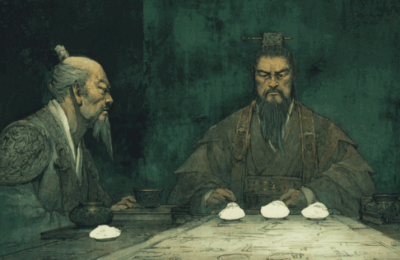《上博简〈君人者何必安哉〉|楚国CEO为立人设过度“卷”自己,竟导致公司濒临破产?》
在上博简〈君人者何必安哉〉中,我们看到的不是一位“清心寡欲”的圣人楚王,而是一场精心策划却彻底翻车的“人设工程”。楚王以为只要戒色、戒乐、戒欲,就能为自己立下完美德行的招牌;然而老臣范戊却用白玉、三违与史例,把这块闪亮的招牌当场撕毁,揭露这是最危险、最失败的治理策略。一个只想“看起来无懈可击”的统治者,往往最先在现实中崩盘:他不听礼乐使国家失去文化之本,不近女色导致继嗣岌岌可危,隆祭无乐则斩断了祖先与国家的精神链路。民众认为他虚伪矫饰,甚至连鬼神都不会再为他作保。当桀、纣、幽、厉与灵王乾谿之殒的阴影被摆在眼前,那句“君人者何必安哉”便成为穿越两千年的重锤:治理不是修行,人设无法代替责任。楚文明留给后世的警告很清楚——真正的明君不是禁欲的圣徒,而是敢于承担行动的“真人”。In the Shanghai Museum Chu Slips “Junrenzhe Hebi Anzai,” what emerges is not a sage-like king purified by abstinence, but a meticulously crafted persona collapsing in real time. The Chu king believed that quitting desire—avoiding music, distancing himself from women, rejecting sensory pleasure—would forge an impeccable image of virtue. Yet Minister Fan Wu dismantles this facade with surgical precision: the unblemished jade becomes a metaphor for unused responsibility, the “three violations” reveal structural failures, and the historical cases of tyrants and the tragic death of King Ling at Ganxi expose the fatal cost of mistaking personal image for governance. A ruler obsessed with looking flawless collapses first in practice: abandoning ritual music breaks cultural cohesion, neglecting heirs endangers succession, and hollow ceremonies sever the lineage between ancestors and state. The people see him as pretentious; even the spirits, Fan warns, will cease to protect him. Against the backdrop of fallen rulers, the cry “Why should a ruler expect ease?” becomes a timeless verdict: governance is not ascetic performance but the courage to act. The wisdom of Chu is blunt—true leadership comes not from a saintly persona, but from being real, responsible, and present.

